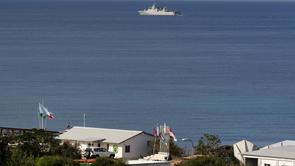 A military vessel of the United Nations peacekeeping force in Lebanon (UNIFIL) is pictured off the coast of the southern Lebanese town of Naqura, on the border with Israel on Nov 11, 2020. (MAHMOUD ZAYYAT / AFP)
A military vessel of the United Nations peacekeeping force in Lebanon (UNIFIL) is pictured off the coast of the southern Lebanese town of Naqura, on the border with Israel on Nov 11, 2020. (MAHMOUD ZAYYAT / AFP)
JERUSALEM - Israel rejected Lebanon's requested revisions to the US-brokered proposal for a maritime border deal on Thursday.
Israeli Prime Minister Yair Lapid was "updated on the details of the new substantial changes that Lebanon is seeking to make in the agreement, and ordered the (Israeli) negotiating team to reject them," a senior Israeli official told Xinhua.
Israeli Defense Minister Benny Gantz tweeted on Thursday that "whether the agreement is signed or not, we are prepared to protect our infrastructure and our sovereignty"
Lapid stressed that he will not compromise Israel's security and economic interests, "even if it means that there will be no agreement soon," the official said.
"Israel will produce gas from the Karish rig as soon as it is possible to do so," the Israeli official added, referring to the Karish natural gas field that is located in the disputed area.
Israeli Defense Minister Benny Gantz tweeted on Thursday that "whether the agreement is signed or not, we are prepared to protect our infrastructure and our sovereignty."
ALSO READ: US mediator: Very good progress in Lebanon-Israel maritime talks
"If Hezbollah seeks to harm them, the military price that Lebanon and Hezbollah will pay will be very heavy," he said.
Hezbollah has not issued an immediate response.
Also on Thursday, Lebanon's caretaker Prime Minister Najib Mikati said that the deal "is of strategic importance" and allows for "avoiding a war in the region," the Lebanese state news agency of NNA reported.
Last week, US Energy Envoy Amos Hochstein sent Israel and Lebanon a draft of an agreement on a maritime line between the two countries. The dispute concerns an area of some 860 square km of the Mediterranean Sea.
READ MORE: Lebanon warns against any Israeli 'aggression' in disputed waters
According to Israeli media, a major point of dispute between Israel and Lebanon was Lapid's announcement that Israel will receive some of the revenues from Lebanese extraction in the Qana natural gas field, located partially in the disputed area.
Israel and Hezbollah fought a deadly war in 2006 that ended with a fragile truce.


